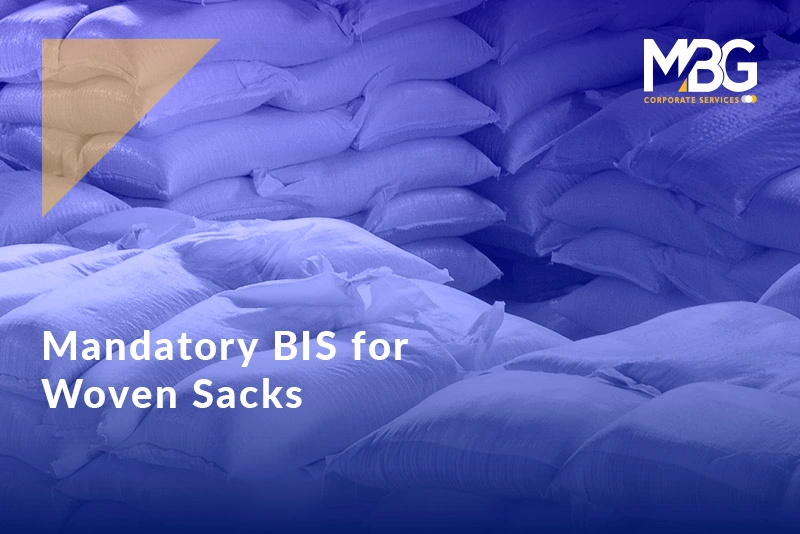Quality Control Order (QCO) in India for PP & HDPE Woven Sacks
Mandatory BIS Certification Effective from 06 September 2025
India’s Quality Control Order (QCO) framework under the Bureau of Indian Standards (BIS) continues to expand, bringing critical packaging and textile products under mandatory compliance. As part of this regulatory enforcement, the Department of Chemicals and Petrochemicals, Government of India, has implemented a Quality Control Order applicable to specific PP and HDPE woven sack categories.
As of today, BIS certification is mandatory for the covered products. Manufacturers and importers supplying these woven sacks to the Indian market must hold a valid ISI Mark License to continue lawful production, import, sale, or distribution.
Effective Date: 06 September 2025 (Now Enforced)
Products Covered Under the Quality Control Order in India
The QCO applies to high-usage woven sacks that are integral to India’s logistics, infrastructure, and industrial supply chains.
1. Polypropylene (PP) / High-Density Polyethylene (HDPE) Laminated Woven Sacks
- Applicable Standard: IS 17399 : 2020
- Primary Use: Mail sorting, storage, transport, and distribution
- Industry Relevance: Used extensively by postal departments, courier companies, e-commerce logistics providers, and government distribution systems where load-bearing strength and durability are essential.
2. Polypropylene (PP) Woven, Laminated, Block Bottom Valve Sacks
- Applicable Standard: IS 16709 : 2017
- Primary Use: Packaging of 50 kg cement bags
- Industry Relevance: Cement is a backbone industry for infrastructure and construction. BIS-certified packaging is critical to prevent leakage, maintain structural integrity during transport, and reduce material loss across the supply chain.
Why This Quality Control Order Matters Now
With the QCO now in effect, BIS certification is no longer optional for the covered packaging products. All manufacturers domestic and foreign must comply to remain operational in the Indian market.
Non-compliance may result in:
- Prohibition on sale or distribution
- Detention or rejection of imports at customs
- Regulatory penalties and supply chain disruptions
This QCO is intended to:
- Ensure standardized quality, eliminating sub-standard packaging that causes handling and transport losses
- Strengthen buyer and institutional confidence through certified compliance
- Align Indian packaging standards with global benchmarks, supporting export readiness
- Improve safety and sustainability, reducing wastage and operational inefficiencies
Who Is Impacted by the QCO Enforcement?
1. Domestic Manufacturers
Indian manufacturers of PP/HDPE woven sacks must already hold a valid BIS ISI Mark License to continue production and supply without interruption.
2. Importers & Foreign Manufacturers
Overseas manufacturers supplying these products to India must comply under the Foreign Manufacturers Certification Scheme (FMCS). Imports without BIS certification are not eligible for customs clearance.
3. Downstream Industries
Industries dependent on certified packaging—including:
- Cement manufacturers
- Postal and courier services
- Logistics and warehousing providers
- E-commerce and bulk distribution companies
are directly affected if their suppliers are not BIS-compliant, making certification a critical procurement and risk-management requirement.
BIS Certification Process for QCO Compliance
To comply with the enforced QCO, manufacturers and suppliers must complete the BIS certification process as prescribed:
- Confirm Product Applicability: Verify whether the product falls under IS 17399:2020 or IS 16709:2017.
- Product Testing: Submit samples to a BIS-recognized laboratory for testing as per the applicable Indian Standard.
- Documentation & Application: Prepare technical documentation, quality manuals, and submit the BIS application with complete compliance details.
- Factory Audit: BIS officials may conduct an on-site inspection to validate manufacturing processes and quality controls.
- Grant of ISI Mark License: Upon approval, BIS issues the license authorizing the use of the ISI Standard Mark, permitting lawful sale in India.
How MBG Corporate Services Supports BIS Compliance
With QCO enforcement now active, delays in certification can directly impact market access. MBG Corporate Services provides end-to-end consulting for BIS Certification under both Domestic Manufacturer and Foreign Manufacturer Certification Schemes.
Our services include:
- Product applicability and standards assessment
- Guidance on Indian Standards and QCO obligations
- Technical documentation and application filing
- Coordination with BIS-recognized testing laboratories
- Audit and inspection support
- Compliance planning to prevent supply chain disruptions
With deep regulatory expertise, MBG helps businesses remain compliant, operational, and market-ready under India’s evolving quality control regime.
Additional Resources
For a deeper understanding of BIS certification requirements, Quality Control Orders, and sector-specific compliance obligations, you may also refer to the following resources:







